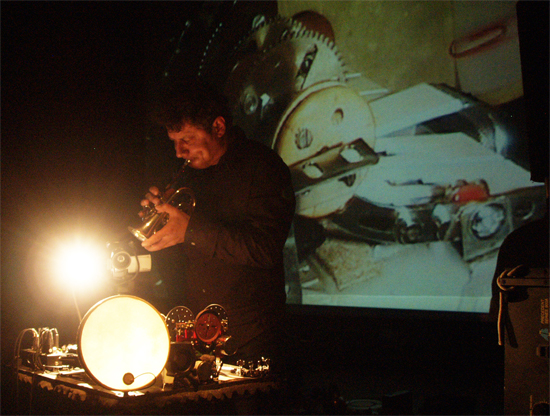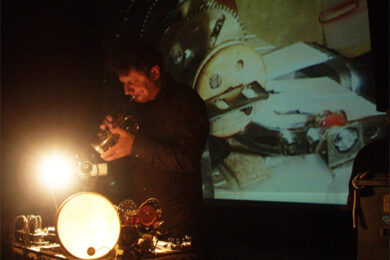Composer, multi-instrumentalist and inventor Pierre Bastien has been constructing unique musical machinery for over 30 years.
Bastien’s initial public performances were as a member of French
collective bands Operation Rhino, Nu Creative Methods and Effectifs de Profil, as well as the Dominique Bagouet Dance Company. He has collaborated regularly with his friend Pascal Comelade, participating in Comelade’s Bel Canto Orquesta, and artists from many other fields including video (Pierrick Sorin), fashion (Issey Miyake) and the circus (Cirque Trottola). Other musical collaborators have included Robert Wyatt, Jaki Liebezeit and Jac Berrocal.
Bastein’s Mecanium is a self-built orchestra of musical automata, constructed largely from Meccano and powered by turntable motors, playing acoustic instruments including percussion, wind and string. Since the 1980s, the Mecanium has toured the world, with Bastien accompanying it live on pocket trumpet or other instrumentation.
He visits the UK next month for a short Toy Music tour with Polish group Male Instrumenty [Small Instruments], culminating in an appearance at Supersonic, Birmingham on October 24. Bastien spoke to The Quietus by phone from The Netherlands.
When was the last time you played in Britain?
Pierre Bastien: The last time was at the Bath Festival this year. But before that I took part in Sound UK’s programme Fertilizer. And I toured with Squarepusher four years ago, and took part in three ‘raves’ probably, because it was more than a concert – the whole night was music. Also in London, I played at the Rough Trade store when it was at Covent Garden in the afternoon, that was very small but very nice. And a very nice concert organised by, I think, The Wire and a label called Chill Out – I don’t know if it still exists.
How did Squarepusher’s audience take to you?
PB: I never dared to look at the people! Laughs] I was a bit scared actually! I was playing almost first, Luke Vibert was warming up the place and I was right after him. I think it was kind of an introduction to the rest [of the evening], but it was very audacious of Tom [Jenkinson] to invite me there. I think it went well, but I never dared to check if they were dancing or not so I’ll never know. Probably not of course, but moving at least, I hope, a little bit! [Laughs]
Have you performed with Male Instrumenty before?
PB: One and a half years ago they invited me to take part in a festival in their home town, Wroclaw in Poland. I didn’t know them before that. We were playing the same night – I played and then went to their concert in another venue. I liked it very much, they reminded me of my friend Pascal Comelade because they play with small instruments, mainly toys. I was amazed that people were interested in small instruments and could also improvise the music on the spot. With Pascal, we were playing his music, that was the main difference. Then they invited me again and we played together. We improvised less, but they’d learned some of my pieces. One of them I’d never played it on stage because I thought it was impossible, ‘cos I had lowered the
speed of my tape recorder to change the pitch of some instruments.
There were some manipulations in the recording that I thought would be impossible to play. They learned the score, they wrote the music down, and they played it on kazoos! And it was a wonderful result! [Laughs]
Will you be collaborating onstage on the British dates?
PB: It was a misunderstanding at first, because both of us – Pawel [Romanczuk, from Male Instrumenty] and me – understood that we would play together. Then they [Sound UK] said we want you to play [the concerts in] two parts. I like that very much, because this is an opportunity for us both to present our music, without mixing. We probably will mix at certain moments, when I will join the band for some pieces.
Have you ever visited the Meccano factory in France?
PB: Recently I was playing in Calais where the factory is. It looks like a nineteenth century factory from the outside but is very hi-tech inside and they have beautiful machines.
Are Meccano aware of the use you put their product to?
PB: At a certain moment in the 80s the director, a French man, liked art very much, and he was aware of any artists working with Meccano. There was a famous Italian painter, Enrico Baj, who was painting with Meccano. He did a beautiful book in the 60s called Meccano ou L’Analyse Matricielle du Langage. This director knew exactly who was doing what, and he sent me some 25 kilos of spare parts, and that was wonderful. But some other directors just ignored what we are doing.
Now it’s run by a Japanese brand [Nikko], and it’s become very
expensive. I live in Holland and they have several other brands,
copies of the original Meccano but less expensive, like Temsi, so you can find some parts and it’s compatible. And also the Märklin system in Germany. At the beginning of the First World War the Meccano factory in Germany was nationalised by the Third Reich and they put the name Märklin on the factory. They’re still producing and it’s very convenient, when you don’t find a part in the Meccano shop you can buy it from the Germans.
You have a forthcoming album on Rephlex too [Bastien’s third for the label]?
PB: Yes, but it will not be ready in time unfortunately. It’s a CD and a DVD. The provisory title is Kinetic Syncapatos. It may be a difficult title, maybe I’ll make it more simple.
Like [second Rephlex album] Pop?
PB: Pop was too simple. When I Google ‘pop’ I cannot find my work! [Laughs]
Why do you use palindromes for many of your titles?
PB: It’s a bit embarrassing to sum up music in one, two or three
words, so I found a palindrome was the best way to describe it without it making sense. The meaning comes by chance, just by the combination of letters. Also the palindrome works a bit like my machines – as a loop. I wanted to stop a bit with the palindromes, so my provisory titles now are just related to all the record labels I loved in the past, like Obscure and Okeh and Wergo. All those labels focussed on ethnic music, like Ethnic Folkways and Ocora, I loved them because through them I could discover the music of the world.
Obscure was definitely one of the labels who inspired me a lot, especially Max Eastley & David Toop’s New & Rediscovered Musical Instruments – I still have it and still listen to it. FMP was great, and ESP, a great label from the 60s, and Leo Records, because through Leo you could discover the music from eastern Europe, plenty of wonderful labels. So I wanted to pay homage to those labels in a humble way.
Pierre Bastien tours the UK from 19-24 October in a double bill with Polish toy orchestra Male Instrumenty. For more information and tour dates, visit the Sound UK site. Pierre Bastien also plays this year’s Supersonic Festival, held in Birmingham between October 22nd and 24th 2010



